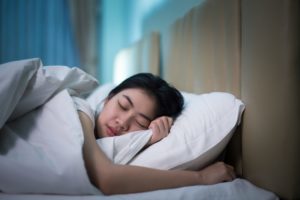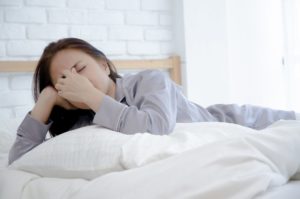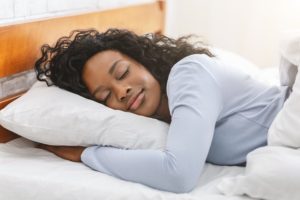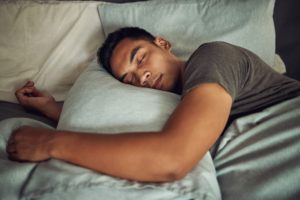When you buy through our links, we may earn a commission. Products or services may be offered by an affiliated entity. Learn more.
How to Get More Deep Sleep: Tips for a Restful Night
- Deep sleep, or stage 3 NREM sleep, is a crucial stage of the sleep cycle that promotes physical and mental restoration.
- Prioritize sleep hygiene, manage stress, and eat mindfully to increase time spent in deep sleep.
- Seek professional help when sleep problems are impacting your sleep cycle or interfering with daily life.
Deep sleep is an important part of sleep that helps sleepers wake up feeling refreshed. Deep sleep has many health benefits including repairing and regrowing bone and muscle and strengthening the immune system. Most deep sleep happens in the first half of the night.
We discuss tips to help people get more deep sleep naturally, including the benefits of a consistent sleep schedule, stress management and relaxation, caffeine and alcohol avoidance, and a comfortable sleeping environment. People should talk to a doctor if sleeping problems do not improve after trying these tips, or if sleeping problems significantly interfere with their lives.
Are You Getting Enough Deep Sleep?
A variety of issues can cause degrade your sleep quality. Answer three questions to understand if it’s a concern you should worry about.
Tips for Getting More Deep Sleep
The best way to get more deep sleep is to get enough total hours of sleep and to follow evidence-based tips for healthy sleep. Most deep sleep happens in the first hour or two of sleep. As a result, sleep habits that help people fall asleep faster may also help them to get more deep sleep naturally.
People can also cut out or limit things that make it harder for them to get deep sleep. In some cases, sleepers can make simple changes on their own. However, people should talk to their doctors if they think a medical condition or medication is interfering with their sleep.
Go to Bed On Time
Go to bed and wake up at the same time every day. While it may be tempting to stay up late or sleep in on weekends and other days off, research has shown that an inconsistent sleep-wake schedule affects people’s circadian rhythms. Keeping a regular sleep schedule helps people fall asleep faster so they can get the deep sleep that they need.

Relax and Manage Stress
Stress and anxiety can make sleeping difficult. Researchers have found that people with a lot of stress not only have difficulty sleeping, but also get less deep sleep . Calming activities that reduce stress may help people sleep more deeply.
Relaxation exercises, deep breathing, yoga, and meditation can naturally reduce anxiety and may improve sleep . Taking a bath, reading, or listening to quiet music before bedtime may also leave sleepers relaxed and ready for deep sleep. In addition to relaxing activities, sleepers should try to avoid discussing or thinking about stressful topics before getting into bed.
People should talk to their doctors if stress and anxiety do not improve with self-care or significantly interfere with their lives.
Avoid or Limit Caffeine and Alcohol
Caffeine and alcohol both reduce sleep quality and keep people from getting deep sleep. People who want to improve their sleep should avoid caffeine and alcohol in the evening. However, people who regularly drink large amounts of alcohol should talk to their doctors before quitting or markedly cutting down on alcohol, as alcohol withdrawal can be dangerous.
Keep a Comfortable Bedroom
People in pain or discomfort often have difficulty getting deep sleep. Loud noises and bright lights in or near the sleeping environment may also make it difficult to get deep sleep. To get the best possible sleep, sleepers should keep their bedroom dark, quiet, and cool with a comfortable bed and pillows. Ear plugs, sound machines, and blackout curtains may help people who live in noisy or bright locations.
How Much Deep Sleep Do I Need?
Sleep is generally divided into non-rapid eye movement (NREM) and rapid eye movement (REM) sleep. As people fall asleep, they advance through three stages of NREM sleep, followed by a period of REM sleep. This cycle through each sleep stage is repeated four to six times each night.
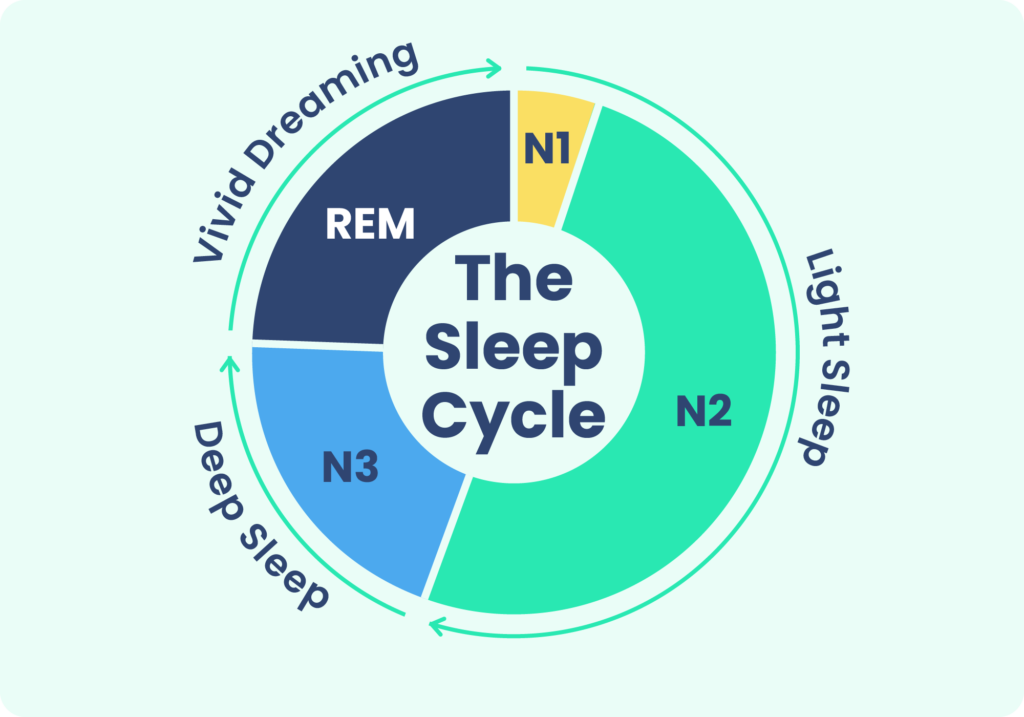
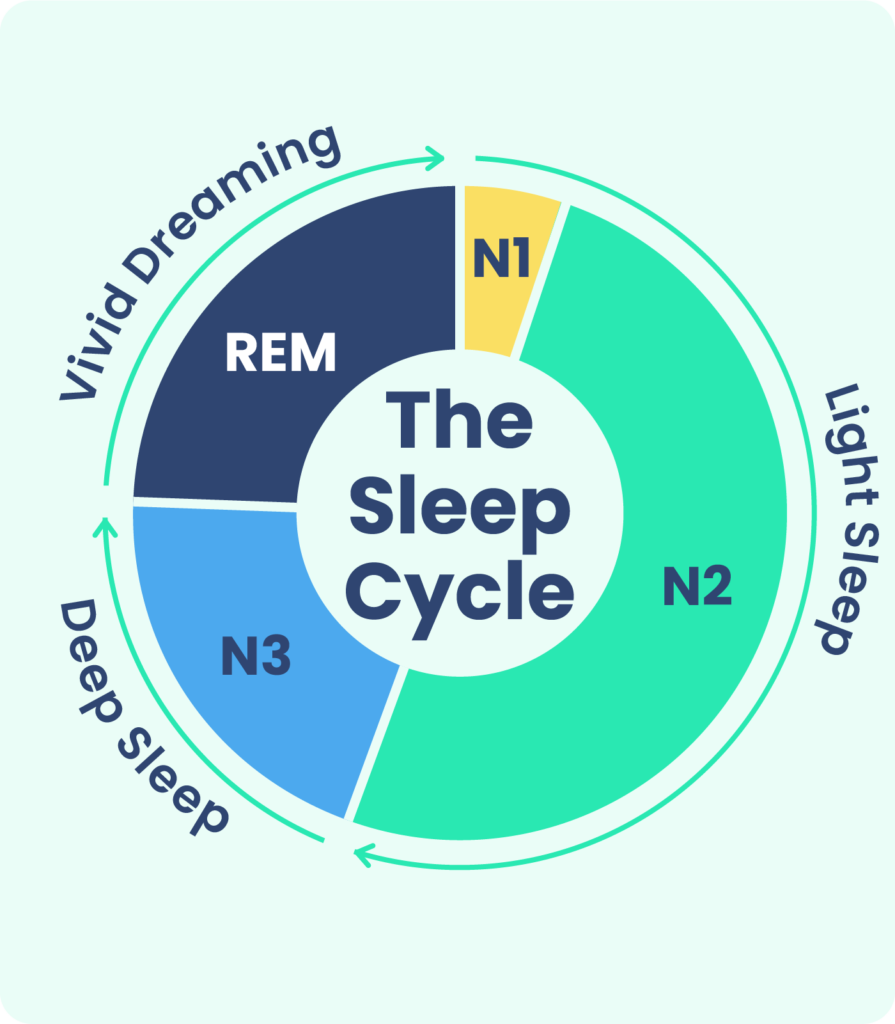
Stage 3 of NREM sleep is considered “deep sleep” or high quality rest that helps people feel refreshed when they awaken. Sleepers’ heart rates, breathing, and brain waves are slowest during deep sleep, and their muscles are very relaxed. Most deep sleep happens in the first half of the night.
There are no guidelines for the amount of deep sleep a person needs, though most adults spend about 10% to 20% of each night in deep, stage 3 NREM sleep. Older adults usually get less deep sleep and REM sleep than middle-aged adults. Various substances and medical conditions can also affect the amount of time spent in deep sleep.
The body naturally regulates the amount of deep sleep a person gets each night. For example, people who are sleep deprived may get more deep sleep due to a phenomenon called rebound sleep . Rebound sleep involves having more REM and deep sleep after a period of sleep loss.
Benefits of Deep Sleep
Although researchers are still uncovering the role and benefits of each stage of sleep, deep sleep may have important health benefits. Studies suggest that deep sleep helps people wake up refreshed, restores the body, and helps with learning and memory formation.
- Hormone regulation: Deep sleep may help to regulate several hormones in the body, including growth hormone and prolactin. Growth hormone affects a variety of processes in the body, including growth and metabolism. Prolactin is an important hormone for pregnant people, contributing to breast growth and lactation.
- Immunity: Deep sleep also strengthens the immune system by supporting the hormonal shifts needed for the body to respond to foreign or disease-carrying organisms.
- Learning and memory: Researchers believe that NREM sleep stages promote learning and may play a role in memory formation. While deep sleep likely has an important role in the process of memory formation, exactly how deep sleep affects memory is still unclear.
- Clearing waste products: Deep sleep may play a role in clearing out waste products from the cerebrospinal fluid that build up during the day. Deep sleep may be particularly important for removing waste products associated with the development of dementia.
What If I Do Not Get Enough Deep Sleep?
Not getting enough deep sleep may affect the release of important hormones, interfere with learning and memory, and hamper the removal of waste products from the cerebrospinal fluid.
Sleep loss in general is associated with difficulties focusing and thinking clearly. Sleep deprivation can also cause a person to have mood changes or to feel so tired that it interferes with their daily activities . Sleep loss also increases the risk of accidents and mistakes at work or school due to excessive sleepiness.
Over the long term, people who do not get enough sleep are at risk for several health conditions including heart conditions, high blood pressure, and stroke. Chronic sleep loss is also associated with an increased risk of obesity and type 2 diabetes.
When to Talk to a Doctor About Sleep Problems
People should talk to a doctor if they have sleep problems that do not improve after implementing healthy sleep tips or that significantly interfere with their daily life. People should also talk to a doctor if they suspect their sleeping problems may be caused by a health condition or medication.
Depending on a person’s needs, a doctor may recommend tests or treatments for sleep problems. For example, a doctor may ask a patient to keep a detailed sleep diary to better help them understand their sleep patterns. If a doctor suspects a sleep disorder, then they may recommend a sleep study to help diagnose the condition. If the doctor suspects the sleep problems are caused by a medical condition, then they may do additional tests for that condition.

Still have questions? Ask our community!
Join our Sleep Care Community — a trusted hub of sleep health professionals, product specialists, and people just like you. Whether you need expert sleep advice for your insomnia or you’re searching for the perfect mattress, we’ve got you covered. Get personalized guidance from the experts who know sleep best.
References
6 Sources
-
Maski, K. (2022, May 23). Insufficient sleep: Evaluation and management. In T. E. Scammell (Ed.). UpToDate.
https://www.uptodate.com/contents/insufficient-sleep-evaluation-and-management -
Beck, J., Loretz, E., & Rasch, B. (2022). Stress dynamically reduces sleep depth: Temporal proximity to the stressor is crucial. Cerebral Cortex.
https://pubmed.ncbi.nlm.nih.gov/35196708/ -
Martin, J. L. (2022, October 10). Cognitive behavioral therapy for insomnia in adults. In R. Benca (Ed.). UpToDate.
https://www.uptodate.com/contents/cognitive-behavioral-therapy-for-insomnia-in-adults -
Léger, D., Debellemaniere, E., Rabat, A., Bayon, V., Benchenane, K., & Chennaoui, M. (2018). Slow-wave sleep: From the cell to the clinic. Sleep Medicine Reviews, 41, 113–132.
https://pubmed.ncbi.nlm.nih.gov/29490885/ -
Cirelli, C. (2022, October 10). Insufficient sleep: Definition, epidemiology, and adverse outcomes. In R. Benca (Ed.). UpToDate.
https://www.uptodate.com/contents/insufficient-sleep-definition-epidemiology-and-adverse-outcomes -
Chervin, R. D. (2022, October 4). Approach to the patient with excessive daytime sleepiness. In T. E. Scammell (Ed.). UpToDate.
https://www.uptodate.com/contents/approach-to-the-patient-with-excessive-daytime-sleepiness



